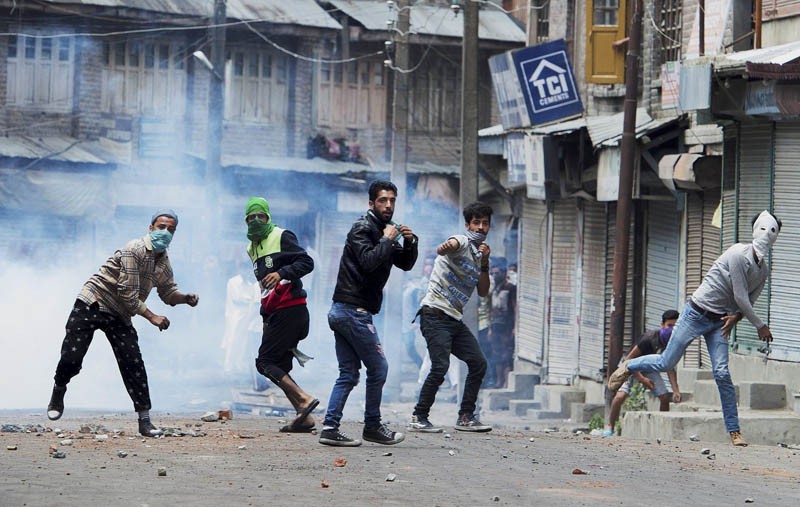

Burhan Wani, resident of Dadsara village of Tral area of Pulwama, was killed in an encounter on July 8 along with two of his ‘accomplices’ identified as Sartaj Ahmad Sheikh and Pervaiz Ahmad Lashkari. As reported in the press, Wani and his comrades were killed in Bumdoora village of Kokernag, by a joint team after being besieged by Special Operations Group of the Jammu and Kashmir Police and 19 Rashtriya Rifles.
Wani was killed for his allegiance with a militant group Hizbul Mujahideen, which originally was founded in Pakistan but is conjectured to have struck its roots Indian held Kashmir. Hizbul Mujahideen provides an umbrella to those, aspiring and striving for Kashmir’s independence.
Burhan, son of Muzafar Ahmad Wani, Principal of a higher secondary school, went on to join that group in 2011 at the age of 15 and earned instantaneous popularity on the social media. Vani’s social media campaign had an extensive outreach among a section of Kashmir Muslim youth. In one of his videos, he persuasively appealed the youth to join Hizbul Mujahideen and is widely believed to have recruited at least 30 youngsters from South Kashmir. In a similar sort of a video, he threatened deadly attacks to be carried out against the men in uniform. The Indian government had put Rupees one million bounty for finding Burhan. That action by the Indian Security Forces re-ignited the smouldering embers of discontentment among the Kashmiris.
On hearing the news of Wani’s death, a pang of anguish pervaded through the Kashmiri populace. At his funeral on July 9, the crowd was so dense that holding funeral prayers became quite a daunting task; this speaks volumes about the popularity of the deceased 21 year old youngster. Militants in the midst of the funeral offered Burhan a 21 gun salute and his body was wrapped in a Pakistani flag before burial.
Over the next days, angry protests spread throughout the valley and by July 16, 43 people had lost their lives and over 3,100 were wounded, including a number of security personnel. More so, 117 civilians were injured by blasts of buckshot with impending prospects of losing their eyesight. Mobs attacked 20 police stations and made away with the weapons stored there, which were used against the security forces. A Bharatiya Janata Party office was also was vandalised in Kulgam.
As Arundhati Roy puts it, "while the government goes about trying to silence the living, the dead have begun to speak up". Of course, the dead Burhan Wani has stirred the whole Kashmir, which he could not do when alive.
The Kashmir valley has witnessed the worst outbreak of violence in the last six years but, according to some analysts, signs of imminent trouble could already be spotted on the horizon. Nevertheless, no measures were taken in anticipation of what was brewing up. That is a quandary pertaining to the insouciance of Indian rulers. That was a stark failure of the ungainly coalition of the People’s Democratic Party (PDP) and Narendra Modi-led BJP, that had hardly any understanding of and also little patience for the disgruntlement of the Kashmiris.
The PDP, despite its efforts to spread patronage and to exploit fears of Islamic radicalism, is widely perceived as stooge of New Delhi. This fact can hardly be denied that the level of violence in Kashmir has come down drastically since 2001 but the situation has remained far from normal. The frustration among Kashmiris, and particularly among the young people, has grown considerably because of the lack of good jobs they have to share with other Indians, for whom they have no love lost.
Curiously enough, despite 67 years having gone by, several Indian governments came and went but none of them could manage to integrate Kashmir into the Indian Union. It could not be made possible through political process. On several occasions, elections were held but the desired result remained a far cry. Autonomy to the Kashmiri people was promised but its delivery did not materialise. Sustained political endeavour to address the grievances of Kashmiris was set at rest when convulsion began to creep into the ranks of otherwise peaceful people.
Coercive sinews of the Indian state came into play in order to suppress those demanding their rights. Kashmir, they thought, could be tamed through force. Prior to Ranjit Singh’s occupation of Kashmir, Afghans had deployed force to fleece Kashmiris. Then came the turn of Dogras who bequeathed Kashmir to the Indian state in 1947. Thus the pattern of unleashing force and terror continued.
From Nehru to Modi, Kashmir was kept and administered like a colony, and the right of self-determination for the Kashmiri people amounted to an act of treason. Strife was what defined Kashmir during the 1990s. Large contingents of Army were stationed there to bring calm to the turbulent region. Arundhati Roy calls it "the densest military occupation in the world" because for a population of 10 million people, an estimated 600,000 armed personnel are actively deployed.
As late Eqbal Ahmed once said, any movement, spearheaded by its political wing, has a greater likelihood of securing success than those movements with more powerful militant wings. Eqbal Ahmed’s dictum holds water for both India as well as Pakistan which has its stake in Kashmir, though I am not dealing with Pakistan’s involvement in the Kashmir in this article. What I am trying to underscore is the inability of Indian state to prove the veracity of its claim that Kashmir is its integral part. That inability of India of wooing Kashmiris is explicitly demonstrated. Consequently it is holding on to Kashmir through force which hardly is a recipe of a success.
The problem that has beset India is of its own making though it blames it on Pakistan. The rot always starts from within, and it is much afterwards that external force(s) step in.